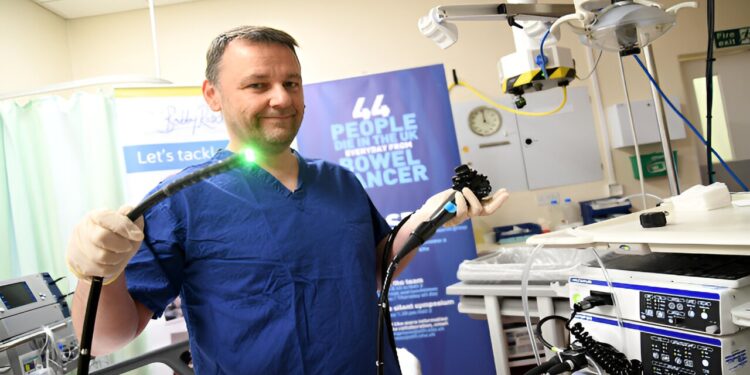Professor Colin Rees led the COLO-DETECT study. Credit: Newcastle University
Newcastle University has successfully conducted a trial using artificial intelligence (AI) in colonoscopies to detect abnormalities that could potentially lead to bowel cancer.
Newcastle University, South Tyneside and Sunderland NHS Foundation Trust led the COLO-DETECT trial involving 2,032 patients from 10 centres across England. The research is published in The Lancet Gastroenterology and Hepatology newspaper.
The trial used the GI Genius AI device, an AI-powered computer module that adds to existing technology used during a colonoscopy. The results showed greater effectiveness in detecting tumors that could potentially become cancerous (adenomas).
As a result, the Trust will continue to make the equipment available to its teams based in the endoscopy units at South Tyneside District Hospital and Sunderland Royal Hospital.
“It’s about spotting things that the human eye might miss.”
Professor Colin Rees, who led the trial and is also professor of gastroenterology at Newcastle University, said: “We are delighted with the outcome of this trial. In other words, it will save lives.”
“This trial has demonstrated that using artificial intelligence can significantly improve the detection of the types of intestinal abnormalities that are likely to develop into cancer. It allows us to find these lesions, remove them and prevent them from developing into cancer.
“We know that some of the polyps that lead to cancer are small or flat. AI has helped us find more of these lesions. It detects things that worry us and spots things that the human eye might miss.”
“It will only get better”
COLO-DETECT was a randomized controlled trial, with half of the 2,032 participants in the procedure having undergone a colonoscopy using AI, and the other half having undergone a “traditional” colonoscopy.
A colonoscopy is a procedure in which a camera is used to look inside the intestine, looking for cancerous and precancerous polyps (adenomas).
The test involves placing a green box around possible polyps on the screen, which shows what the camera can see, with the clinician ultimately deciding whether or not to remove the polyp.
There are around 43,000 new cases of bowel cancer in the UK each year, and Professor Rees hopes the technology will now be adopted more widely to detect the early signs of the disease.
Professor Rees added: “It’s a tragedy because bowel cancer is a disease that people shouldn’t die from. We have a long window of time in which these polyps develop, probably about 10 to 15 years from the time they develop to a point where they become cancerous.
“We’re using this technology routinely in our practice now, and I really hope it’s used more widely. The great thing about AI is that it learns. It trains by looking at images, using the data to find the differences between images, and it’s constantly adding to its knowledge, so it’s only going to get better.”
More information:
Alexander Seager et al., Polyp detection by colonoscopy assisted by the artificial intelligence endoscopy module GI Genius compared to standard colonoscopy in routine colonoscopy practice (COLO-DETECT): a multicenter, open-label, parallel-arm, pragmatic randomized controlled trial, The Lancet Gastroenterology and Hepatology (2024). DOI: 10.1016/S2468-1253(24)00161-4
Provided by Newcastle University
Quote:AI shows greater efficiency in detecting early signs of bowel cancer (2024, August 15) retrieved August 15, 2024 from
This document is subject to copyright. Apart from any fair dealing for the purpose of private study or research, no part may be reproduced without written permission. The content is provided for informational purposes only.



